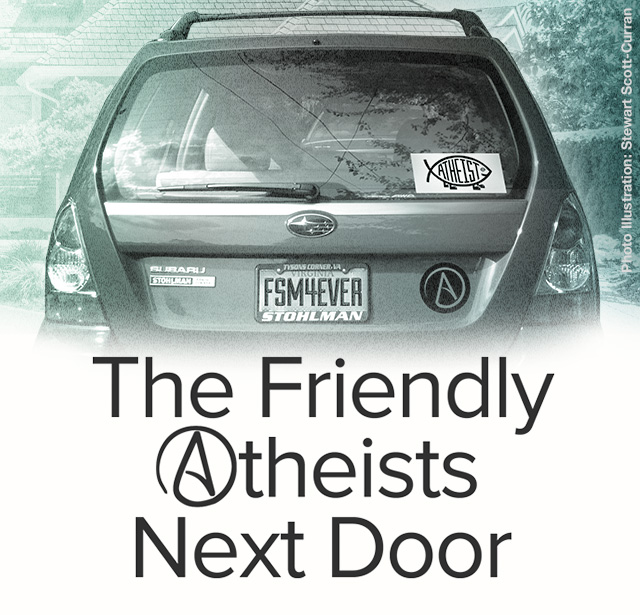
Videos by Connor Boals, CNN
Wake Forest, North Carolina
It's two weeks before Christmas, which means the Shaughnessys are deep into their December rituals.
Cookies have been baked and sprinkled with enough sugar to give a gingerbread man diabetes. A Christmas tree, sparkling with colored lights and surrounded by a small troop of Santa Clauses, stands in the corner of the living room, waiting.
Harry and Charlotte Shaughnessy watch their children dip into a stash of ornaments: a Welsh flag from Grace's semester abroad; a bauble from the University of North Carolina-Wilmington, where Todd is a freshman; a trinket embroidered with Brennen's name and 1998, the year the youngest Shaughnessy was born.
Harry, nursing a rum and Coke, smiles at the sight of an even older ornament: a stocking that says "Charlotte and Harry, 1988," their first Christmas as a couple.
In those days, the Shaughnessys were Catholic. They herded their children to Mass on Sundays and celebrated the sacraments, mostly. While Charlotte taught at the parish school and Harry started a computer consulting business, they tried, for the most part, to follow the church's doctrines.
Quiz: What type of atheist would you be?
Intellectual? Activist? Apatheist? Take the quiz »
But one day a question cracked the foundation of Harry's faith, and the fissure slowly widened until the walls shivered and the roof shook and the whole damn house fell down. Like most demolitions, it caused a disturbance.
Harry, who turns 44 next month, comes from a long line of Catholics. The kind of people who call a priest when trouble erupts and see God's touch in every corner of their lives.
As the Christmas tree fills with family artifacts, Harry announces that it's time for the topper.
"Whose turn is it this year?"
"Mine!" Brennen yells, grabbing a tangle of pipe cleaners and yellow felt.
After terse negotiations, Grace, the eldest, climbs the stairs to nestle the ornament in the treetop.
It has noodle-like limbs and googly eyes. This is no angel, no star of Bethlehem. This is the Flying Spaghetti Monster.
Right about now, I imagine you might have two questions: 1. Why are atheists celebrating Christmas? 2. What, pray tell, is the Flying Spaghetti Monster?
The Shaughnessys celebrate Christmas, Harry says, for some of the same reasons other people do: "Because it's a great time to get together, care for each other and have a party."
"And who doesn't want a tree with pretty lights in their house?" Charlotte chimes in.
Since they aren't Christian anymore, the Shaughnessys shape their own holiday traditions. One year, they stretched Christmas across a week, with celebrations leading up to December 25. "That sounds so Jewish now," Harry jokes. It was anticlimactic, Grace says. When Christmas came, they had nothing left to give, nowhere to go. The ritual was not repeated.
But the Flying Spaghetti Monster stuck.
The Church of the FSM, as "Pastafarians" call it, is a faux religion founded in 2005 to satirize creationism. It has since become a symbol for everything atheists find silly and superstitious about faith.
On CNN TV
To learn more about atheism: Watch "Atheists: Inside the World of Non-Believers" Tuesday at 9 p.m. ET on CNN.
Harry made the FSM ornament several years ago, after deciding the angel atop the Shaughnessys' tree no longer fit the family. It was a small but symbolic moment, this changing of the guard. As the monster knocked the angel aside, it nearly announced: The Shaughnessys were "out" as atheists.
Nearly.
The Flying Spaghetti Monster had to hide when Harry's parents came over for dinner. It was shunted out of sight, an emblem under cover, a secret that illuminated another aspect of Harry's long and sometimes painful path to atheism:
Each step, even the ones that brought him happiness, carried him further from the faith that had once comforted his conscience, bonded his family and still guides many of them, God willing, to a heavenly hereafter. Knowing this, Harry did what many of us might. He hid his doubts, stashing them in some dark room with his secret fears and his irreverent ornament.
Which worked fine, until it didn't.
Harry tries to shine a sunny face on life, but the bags beneath his eyes darken when he's stressed out and can't sleep, which has been often of late.
Still, he is happy this Christmas. He has finally found something to nourish his head and his heart, the places where his faith once lived. He hopes it will last.
The first time I caught sight of Harry Shaughnessy, he was wearing a red cape, a skin-colored bodysuit and a crown. Carrying a scepter, he marched to the stage where his friend was receiving an award from the Freedom From Religion Foundation, a national group that promotes atheism.
As its name suggests, the Emperor Has No Clothes Award salutes people who lay bare religion's supposed shortcomings. Todd Stiefel had earned the honor, but Harry dressed the part and stole the spotlight.
The strange scene unfolded last May in Raleigh, North Carolina, where some 200 atheists had gathered for a conference on nonbelievers in the Bible Belt. Harry's prank, I later learned, was part of a war with his friend over who can embarrass the other more in public. The consensus seems to be that Harry is winning. On his list of life skills, relentlessness ranks higher than discretion.
A few hours after his naked-emperor prank, Harry and I met in person. He has a flop of brown hair and the moonlight skin of someone who spends a lot of time staring at screens. He finds humor everywhere, and it's the rare conversation that ends without a smile starting to curl across his lips.
Initially, Harry struck me as a typical American atheist. He is white, upper middle-class, college-educated and, as should be clear, male, all common traits among unbelievers.
Opinion: Becoming a 'seeker'
"My job is to ask tough questions", writes CNN's Kyra Phillips. "But when it comes to faith, God and religion, the more questions I ask in my quest for truth and understanding, the more complicated the answers become." Read the story »
His religious past is quite common as well. If you gathered all the ex-Catholics in the United States, they would form the country's second-largest religion, with nearly 23 million "members." Only the Catholic Church itself is larger.
By comparison, the number of self-identified American atheists is small – less than 3% of the adult population. But that number has been inching upward, passing American Jews (2.2%) in the latest round of surveys.
I've been following that ascension for years, watching America's "atheist awakening" burst forth from a few best-sellers to become a force with the potential to reshape the country's culture, politics and spirituality.
But I am also interested in the small picture – less atheism as a mass movement and more the thoughts that flicker and burn through someone's mind as he forsakes faith. As a man like Harry begins to bend toward atheism, what are the turning points, and what happens after the last corner is turned?
I talked to Harry for 10 months about those questions. And the more I asked, the more complex his answers became. I soon realized that Harry is not a typical atheist. He's part of a bevy of former believers who, while trying to raise atheist children and create secular communities, are tapping an unlikely source: the religions they left behind.
This may sound like returning to a restaurant whose food you found unappetizing and asking for the recipe. A more charitable view might acknowledge that religion has met human needs for millennia and knows a few things about how to make people feel fulfilled and inspired.
The atheists reaching back into their religious past don't fit the stereotypes. They are neither famous nor angry. They're not Bill Maher or Richard Dawkins. They are friendly, next-door neighbors who work regular-Joe jobs, ferry their children to soccer practice and try to lead happy, honest lives without faith. Ned Flanders, say, without the Homeric neighbor or the okily dokily God.
But when you live in the Bible Belt and come from a big Irish Catholic family, you're not supposed to become a nonbeliever, much less lead a new phase of atheism. You're supposed to sit in church, say your prayers and raise your children to do the same.
During our first interview, I asked Harry about the costs of becoming a nonbeliever.
He sighed, and a cloud crossed his face.
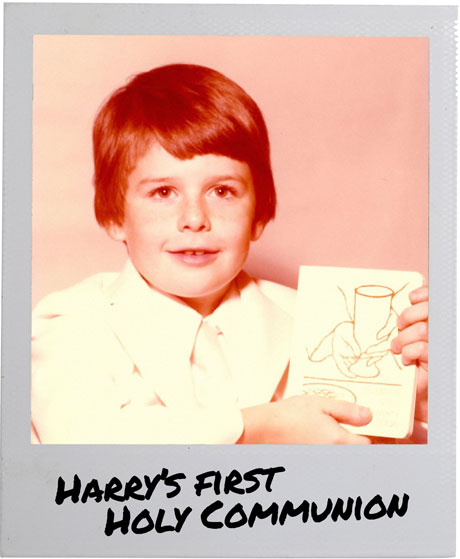
Harry was raised in a cocoon of Catholicism. Nearly everyone the Shaughnessys socialized with belonged to their church or attended their parish school.
Every so often, a priest would stop by for dinner, which was invariably preceded by the Christian prayer of grace, "Bless us, O Lord, and these thy gifts …"
Jim and Marjorie Shaughnessy conveyed their religious devotion through good deeds, Harry recalls, teaching their children that Christ equips and calls on Catholics to perform charitable works.
They volunteered as Eucharistic ministers, delivering Communion to the homebound and sick. When one of the children was ill and couldn't attend Mass, they would bring the sacrament home and hold a bedside ceremony.
When he was in sixth grade, Harry gave his parents a scare. He was recovering from the flu when his appendix burst. He was rushed into surgery but they feared it was too late. A priest was called to administer last rites, the Catholic Church's deathbed prayers.
Marjorie called her son's recovery a miracle, the hand of Christ healing her child, but Harry wasn't so sure. At the time, it was a rare gap between mother and son. Family members say Harry, the middle child, most resembles Marjorie. They share a gregarious personality and silly sense of humor, effervescences that bubble up from their most defining trait: a steady, unsinkable optimism.
Even so, Harry stuck out among the Shaughnessys.
"Harry's different from the rest of the family," says his older brother, Jim. "He's always made up his own mind, and he's relentless."
As a Catholic schoolboy, Harry's relentlessness was more often applied to making his classmates chuckle than studying the catechism.
When he was in first grade, he was expected to memorize the Act of Contrition, part of the sacrament of confession. One by one, his classmates recited the prayer and were allowed to play outside. Harry was left behind.
"Finally, they were like, 'OK, good enough; we're done," he says with a laugh. "I just could not apply myself to that stuff."
But by the time he left Catholic school, Harry had found a subject that avidly interested him.
During an ice-breaking exercise in drama class at Cardinal Gibbons High School in Raleigh, students were asked to say something nice about a classmate. When the circle came around to a certain strawberry-blonde senior, her partner drew a serious case of the blanks.
"Tell her she has a nice smile," said Harry, coming to the rescue, "because she does."
A few weeks later, that strawberry-blonde senior asked Harry to the prom. He proposed marriage within a year. The family jokes that Harry and Charlotte went to the dance and never came home.
For Charlotte, who is warm and welcoming, with an exuberant laugh, religion wasn't a big part of her family's life. Come Sundays, her parents would drop her off at St. John's Episcopal Church, where she would scurry past the sanctuary and down to the nursery. Even then, her passion was children.
Before she and Harry started their own family, Charlotte readily agreed to convert to Catholicism.
"This is what we have to do to get married, so let's do it," Harry said. "Mom needs this."
They were married in 1991 at a quaint Catholic church on Main Street in Wake Forest. Charlotte was 21; Harry was 20 – too young to drink a toast to their future.
He wore a rented tuxedo with a white rose pinned to his lapel. Charlotte's white silk dress, handed down from her grandmother, bore a train of Belgian lace that stretched past the second row of pews as she knelt near the altar.
In family photos, the newlyweds look happy, a bit uncomfortable as the center of attention, and not a day over sweet 16.

Harry has kept Charlotte laughing ever since – nearly 24 years now. "That's one of the things I've loved about him from the very beginning. He just makes life fun."
Charlotte, in turn, has encouraged Harry to take life more seriously, to recognize that not every paragraph should end with a punch line.
"We balance each other out very well," she says.
They weren't expecting to have children so soon – they were both still college students – but a year into their marriage, a daughter was born. They named her after Charlotte's grandmother: Grace.
In 1996, their second child arrived, Todd, and two years later, Brennen was born. They baptized their boys and went to Mass, but didn't think deeply about the Catholic Church. Like many young parents, they were trying to stay ahead of the next electric bill and diaper disaster.
But as their children grew up, Harry and Charlotte were nudged to take religion more seriously. The kids began asking challenging questions.
"We were like, oh crap," Harry says. "We have to teach them something."
When Grace was ready for kindergarten, the Shaughnessys did what Harry's parents expected, enrolling her in Catholic school.
There were just 10 students in Grace's kindergarten class at St. Catherine of Siena, where Charlotte taught at the school's pre-K. Harry and Charlotte found the school and parish restrictive and full of nosey parkers, which increased the pressure to attend Mass every Sunday, no matter how much the kids screamed and squirmed.
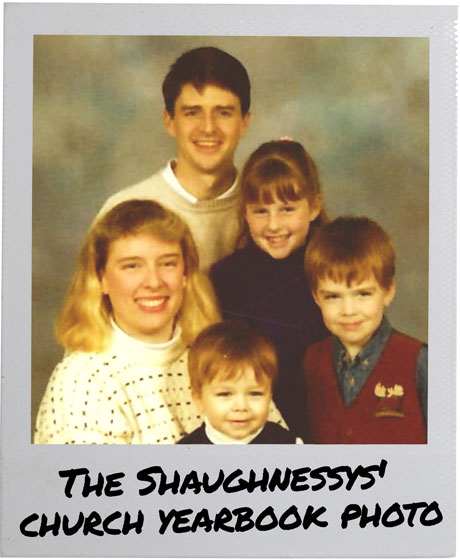
Still, Mass often gave Harry a fleetingly free moment to talk to God. In the silent prayer that follows Communion, he asked God to forgive his sins, to help him be a better man and maybe give his Pittsburgh Steelers a little lift that Sunday.
If God ever responded, Harry couldn't hear it.
He did sometimes feel a "church high," as he puts it. Renewed and inspired, secure about his place in the world and his relationship to God, ready to plunge into the rest of the week.
But as time passed, Harry says, that feeling became harder to find.
The rituals seemed rote, the priest's homilies unconnected to his family's daily life. It didn't help that Harry and Charlotte found few friends at St. Catherine's. They were trying, they say, but the friendships weren't sticking. It's possible that other parishioners sensed their simmering skepticism about the church.
As they entered their early 30s, Harry and Charlotte checked out other Catholic parishes around Wake Forest, looking for a better fit. St. Raphael's down the road. St. Francis' up the street. None seemed quite right.
In 2001, as Grace was preparing to receive First Holy Communion, she asked her parents a question that uncovered their hidden doubts.
She'd been taught that Catholics are supposed to confess their sins to a priest before receiving Communion.
"Mom and Dad," Grace asked, "why don't you guys do that?"
The couple don't remember exactly how they answered Grace's question – it was 14 years ago. But both had misgivings about confession.
Charlotte found it awkward to sit with a celibate man and share intimate secrets – like the fact that she and Harry disobeyed the church's ban on birth control. (They call Grace their "broken condom baby.")
Harry wondered whether telling a priest you're sorry and reciting a few Our Fathers could really wipe a sinner's soul clean. Even Hitler? Charles Manson?
If Harry had talked to a priest, he might have been told that confession doesn't work quite that way. It requires true penitence, a commitment to changing your sinful ways — and in the end, only God decides who to forgive.
But Harry didn't consult a priest, and the more he and Charlotte talked, the more they confessed their conflicts with the church. They disagreed with its opposition to same-sex marriage. They didn't understand the doctrine of original sin, which condemns every infant for Adam and Eve's appetite. The Bible stories, like Noah's Ark, sounded to them like fairy tales.
Eventually, Harry and Charlotte reached the thorniest question: Did they belong in the Catholic Church?
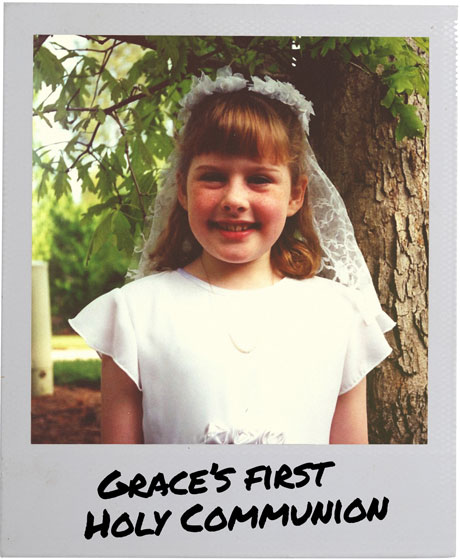
In April 2001, Grace wore a white dress, a pearl necklace from her godfather and a handmade veil atop her bright red hair to receive First Communion. A month later, when school ended, Harry and Charlotte decided not to send her back to St. Catherine's.
If Grace's question about confession cracked open her parents' doubts, the decision to pull her from the parish school pierced their Catholic cocoon. For Harry, it was time to step back and figure out what he believed.
He was 30 years old and still practicing his childhood religion, in part because his parents expected him to. In truth, he'd never delved into religion's depths. There hadn't been time.
During his college years — when many Americans decide the fate of their faith — Harry was working and raising a family. Instead of leading late-night dorm debates about Darwin and Nietzsche, he was writing invoices and changing diapers.
A lifelong technology geek, he majored in mechanical engineering at North Carolina State University. At his father's suggestion, Harry interned at one of the many Fortune 500 companies in North Carolina's Research Triangle. But he hated office politics and drudge work.
He wanted the freedom – and risk — of being his own boss and learning something new every day. He was pretty handy with computers, and a part-time job fixing a local firm's printer led to more IT work and eventually to Harry selling software. Soon, he was pulling in serious money.
As his business bloomed, Harry learned not to trust everything he was told. When he took people on faith – assuming a client would pay his bill or keep a promise — he got burned. Better to place your trust in facts, he thought, the more verifiable, the better.
But that approach didn't work in Harry's spiritual life. With his scientific cast of mind, he likes to take things apart and see how they work. But how does an average guy deconstruct something like the Holy Trinity?
Of course, Harry was far from the first Christian to be flummoxed by the gaps between facts and faith. Thomas Aquinas, arguably Catholicism's greatest scholar, said the doctrine of the Trinity could "never be demonstrably proved." Take it on faith, he advised.
As the Catholic Church's tenets became increasingly untenable to Harry, media reports about sexually abused children flamed into a full-blown scandal involving hundreds of priests, dozens of dioceses and thousands of victims.
Harry and Charlotte say their parish was not directly affected by the abuse. But piled atop his increasing doubts, the scandal broke Harry's faith in the Catholic Church. How could an institution committed to holiness harm so many innocents? This was supposed to be his source of inspiration and morality?
"The world just didn't make sense as Catholic," he says.
Charlotte shared Harry's disillusionment, and they stopped going to Mass. At the time, they offered no explanation to their children. It was too complicated, they thought, and the children were too young.
Their biggest fear was confessing to Harry's parents.
Jim and Marjorie Shaughnessy attend Mass every Sunday and many weekday mornings as well. After teaching at Catholic schools for decades, Marjorie now runs the preschool and catechism classes at their church, St. Joseph's in Raleigh. She doesn't take a dime for the work, says St. Joseph's pastor, Monsignor Jeffrey Ingham.
Harry's father also gives a good deal of his time to the church and its charities, helping Harry's sister organize Catholic conferences and acting as treasurer for the Raleigh chapter of the Knights of Columbus, the Catholic fraternal organization.
It's almost as if Jim is repaying a favor, his family says.
Harry's great-grandfather emigrated from Ireland and settled in Pittsburgh. When he died, a Catholic orphanage helped raise his young children. The family has been loyal to the Catholic Church ever since.
As Harry considered leaving the fold, he wrestled with his conscience: How could he become the branch that breaks from the family tree? The son that breaks his mother's heart?
For several years, Harry and Charlotte hid their faltering faith. Though they no longer attended Mass, they would sit quietly in the pews during their many nieces' and nephews' baptisms.
But they knew their secret would only last so long.
Two years after Grace celebrated her First Communion, Todd turned 7, and it was his turn. Harry's mother kept calling, asking when the ceremony would be held and offering to schedule it at her parish.
Harry and Charlotte wanted to avoid a confrontation, but they could not watch Todd participate in a sacrament they no longer believed in. It would have been hypocritical, they said, and set a bad example for their children.
It took weeks for Harry to work up the nerve, but he knew he had to come clean. One spring night, he called his parents and told them he was coming over to talk.
I'm going to pause the story here to make a short confession. "Confession" may not be the right word, exactly. I haven't done anything wrong. But there's something you should know.
I asked Harry's parents and sisters multiple times to talk to me for this story. They declined. Last December, Harry's brother-in-law, Marc Hurtgen, offered this explanation in an email:
"It is not out of animus toward Harry or anything he is involved in that we are not interested in being part of your article, but rather out of respect for him and the rest of the family and a hope for open (and uncontaminated) discussion about it sometime in the future, should Harry choose to."
Because Harry's parents and sisters wouldn't talk to me, some of the conversations recounted in this story come only from the recollections of Harry and his immediate family, including his children. Interviewed separately, they all agreed on the essential details.
I understand some of the reluctance from Harry's extended family. Heaven and hell aren't metaphors to Catholics like them, and their beliefs place people who don't share them – including Harry – on the wrong side of paradise.
On top of that, atheism carries serious social stigma.
Americans are less likely to vote for atheist politicians, hire atheist job candidates or welcome atheist in-laws, according to surveys. Another study, much lamented by atheists, suggests that nonbelievers are considered as untrustworthy as rapists.
Even Charlotte's liberal mother doesn't want her daughter to call herself an atheist.
At a party at the Shaughnessys' house, as family gathered around the kitchen table, Charlotte's mother, Jean McCamy, tried for nearly half an hour to persuade her daughter to avoid the "A" word.
"That's what I am, Mom," Charlotte said, laughing. "I don't believe in God. That's the definition of an atheist."
"Why don't you want her to call herself an atheist?" Harry asked.
"Well," McCamy said, pausing for a moment, "I just don't like the word."
The conversation wasn't heavy, and McCamy is no zealot. She attends Episcopal services on Wednesday evenings, but calls herself an agnostic – she doesn't claim to know whether God exists. But the casual anti-atheism she admitted to, which is common in the South, is one of many reasons Harry and Charlotte are keen to share their story.
Although Harry's parents declined to talk, I met them twice, at graduation parties for their grandchildren. I saw the way Marjorie kisses Harry's cheek; how Jim cups his shoulder when saying goodbye. I heard Harry's sister tease him about who stole the last piece of the jigsaw puzzle they were all working on last summer.
So I can say at least this much: Whatever differences they have, the Shaughnessys clearly care for each other.
To Charlotte, waiting at home in the kitchen on that spring night several years ago, it felt like forever. Harry says the conversation was short.
He sat down in his parents' living room and confessed.
"Mom, Dad," he said, "I don't think I believe in the Catholic Church anymore."
His mother burst into tears, Harry recalls, and his father's face ran red hot.
Harry tried to explain why he was leaving the church: The sex abuse scandal, the doctrines that didn't make sense any more. He asked his parents if he should try other churches or religions.
No, his mother said.
The Catholic Church is run by fallible men, who sometimes act immorally and tarnish its reputation. But it is still God's one true church, Harry recalls his mother saying.
His parents offered to connect Harry with a priest to talk through his doubts. They suggested Catholic marriage counseling, he recalls.
Harry tried to explain that he wasn't looking for his parents to solve his Catholic problem.
As Harry recalls it, his father looked at him and asked: But if you don't go to church, who is going to raise your children to be moral, ethical people?
Harry was stunned, and says he probably deflected the question with a wiseass remark. But when he returned home and told Charlotte, she blew up. Years later, it still angers her.
"Just because we stopped walking through a church door doesn't mean we've stopped being moral people! The church hasn't been raising their grandchildren, we have!"
Harry, too, says his father's question still stings.
"First it made me angry, then it made me sad," he says. It sounded to Harry like his parents gave the Catholic Church full credit for raising their five children, underestimating their own considerable efforts.
He was also upset that his parents dismissed any idea of exploring other churches.
"Maybe they didn't have faith in me to figure it out," he says. "Anyway, that's when I realized: This is not about me and my beliefs. This is about them and theirs."
Charlotte read a certain sadness in Harry's face after the conversation. He knew he'd hurt his family, especially his mother. But Charlotte thought her husband also looked relieved.
It was out there. They no longer had to make believe they went to Mass, pretend they were still Catholic, mutter along as their family sang and prayed.
Harry felt free, but also lost.
If he didn't believe in the Catholic Church anymore, what did he believe?
For six months, Harry read books about Buddhism and tried meditating, but he isn't good at sitting still, so it didn't have the expected effect. "It never created the Zen-like awesomeness that other people described."
His next faith flirtation, with Scientology, was even shorter.
"I thought, this must be good because it has 'science' in its name." He got as far as the website, where he reviewed the church's tenets. Not very scientific, he thought.
Charlotte suggested the family try her parents' Episcopal church. She wanted her children to join the youth group, which she'd enjoyed as a girl, and thought they should know more about the spirituality that saturates Southern life. (One day, Brennen came home from school asking who Moses was.)
But neither Harry nor the children seemed very interested, so Charlotte let the idea drop. The episode, short as it was, hinted at subtle shifts in how Harry and Charlotte thought about spirituality.
Charlotte, who was never very religious, still considered herself Christian and was willing to settle for a "close enough" congregation, even if no church was a perfect fit.
But Harry had too much at stake to slide into spiritual indifference.
He had been raised to believe that good people go to church; people who deny God go to hell. It's probably the most important decision you make in this lifetime, he thought, and you only get one chance to get it wrong.
Harry became withdrawn, preoccupied with questions that he carried like heavy stones.
"I was surprised by how deeply it affected him," Charlotte says. "It was almost like a death. The death of his faith."
Left alone to search for answers, Harry burrowed into books. Fortunately for him, America's "atheist awakening" was starting to stir.
In 2004, Sam Harris published "The End of Faith," an assault on religion as "the offal of the ancient world." It was followed by equally combative books by Richard Dawkins ("The God Delusion"), Daniel Dennett ("Breaking the Spell") and Christopher Hitchens ("God is Not Great").
At atheist conventions, people speak of these books like holy texts, revere their authors as modern-day prophets.
Many atheists say they avoided revealing their inner struggles to clergy and family, fearing they might be criticized or cajoled back into church, doubts be damned.
Books, in contrast, don't wag a finger in your face. They don't judge; they guide.
Harry had never been a big reader, but between 2004 and 2009, he filled several shelves in his den and the Amazon app on his smartphone. Books allowed him to dig deeply into his questions and see an answer unfold over the course of many chapters.
He listened to books on tape while driving his minivan to sales calls across North Carolina. At home, he binge-read as Charlotte slept beside him. He surfed for atheist arguments and counterarguments online, watching debates and lectures on YouTube.
An atheist's library
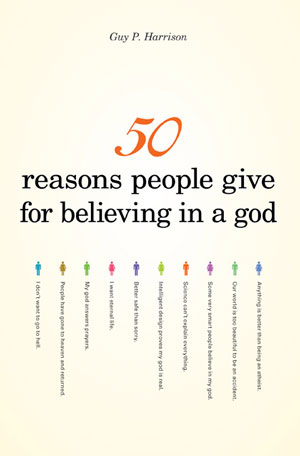
"50 Reasons People Give for Believing in a God" Guy P. Harrison
Harry's review: "You will probably still believe after reading, but you will have a deeper understanding and be more intelligent about belief."
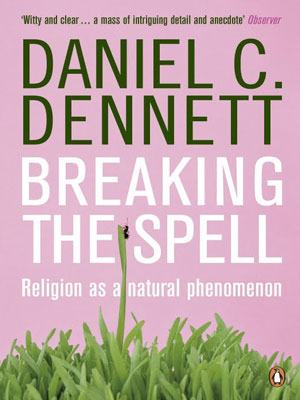
"Breaking the Spell: Religion as a Natural Phenomenon" Daniel Dennett
Harry's review: "It goes a long way toward explaining how billions of people could be wrong, which was a huge problem for me to resolve."
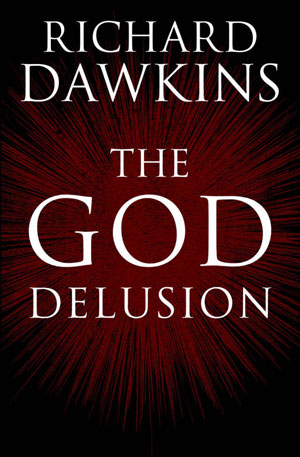
"The God Delusion" Richard Dawkins
Harry's review: "No one makes the case against God better than Richard Dawkins. However, if you take your God too seriously, Dawkins will piss you off."
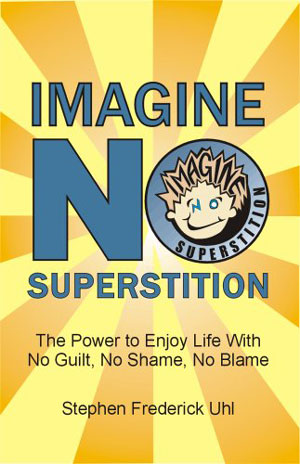
"Imagine No Superstition: The Power to Enjoy Life with No Guilt, No Shame, No Blame" Stephen Uhl
Harry's review: "As a former priest, he provides excellent insight into the issues with the Catholic faith. This book would be a bit hard to read for the believer as Uhl doesn’t hold back."
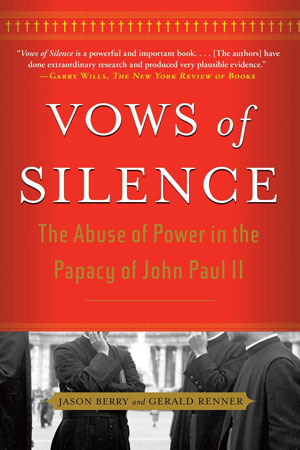
"Vows of Silence: The Abuse of Power in the Papacy of John Paul II" Jason Berry and Gerald Renner
Harry's review: "Details the response (or lack thereof) from the church to the sex abuse scandal. Bring a napkin.” (The story gets messy, Harry says.)
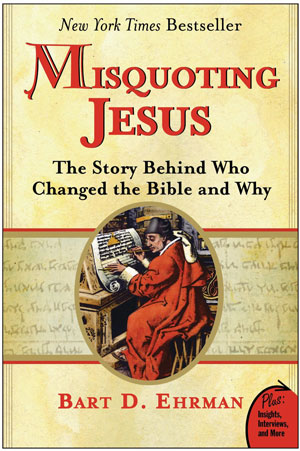
"Misquoting Jesus: The Story Behind Who Changed the Bible and Why" Bart Ehrman
Harry's review: The book helps readers “understand what happened to the Bible and why it is not the inspired word of God.”
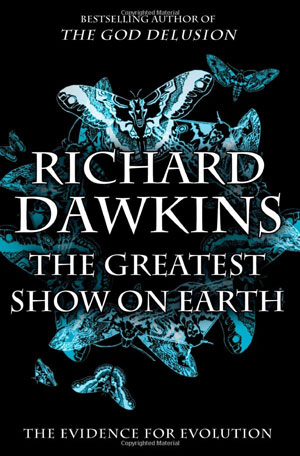
"The Greatest Show on Earth: The Evidence for Evolution" Richard Dawkins
Harry's review: "He behaves nicely in this book, for the most part, so anyone can read and enjoy it."
The books Harry read answered some of his questions about religion, but none of them, by his lights, answered the ultimate question of whether God exists.
He would finish one book convinced he was an atheist. He'd read another and lose confidence.
Sometimes Harry prayed for God to take away his doubts, ease his anxieties. Other times, he suspected that God was an illusion, a figment in the minds of the faithful.
Harry looked tired, the spark in his eyes snuffed out. If there's a dark night of the soul for people not sure they believe in souls, this was it.
One night, he lay in bed, unable to sleep, questions churning through his head.
What kind of God could I believe in?
The God of the Bible? Too cantankerous and spiteful. The Old Testament is basically one long temper tantrum.
The "God of love"? Have you seen the news lately? Not much evidence of a God who loves hurricane victims.
A God who set the world in motion and remains remote? Seems pointless. What good is a God who gives nothing and asks for nothing in return?
What about a God who's part of every piece of nature, suffusing the high stars above and cold dust below? By that logic, God is flesh-eating bacteria, too. Ew, no.
God knows, these are not the only arguments for or against the Almighty, and Harry doesn't remember all the thoughts that meandered across his mind. But he does recall this idea gaining hold: There is scant evidence for the supernatural.
Still, he didn't want to forsake his faith and everything that came with it: the community of believers, the closeness with his family, the sense of meaning and purpose.
None of that, though, helped Harry decide whether God actually existed. At wit's end, he tried an experiment.
At a meeting of local business owners, a life coach had mentioned a means of making difficult decisions: Try it on. If it feels good, keep it.
In the middle of one of many sleepless nights, Harry decided to apply the idea to his religious dilemma. He would act as if God doesn't exist and see how atheism feels.
If God is good, Harry reasoned, he will respect the effort and welcome me back like a prodigal son.
If God is evil, Harry thought, I'm screwed either way.
He didn't tell anyone about his experiment, not even Charlotte.
For the first few days, he felt lost, like he was wandering alone through dark woods, the ground sinking below his feet.
He thought about God during every free moment, driving to work, brushing his teeth, trying to sleep. When he felt frustrated or fearful, he would begin to make the sign of the cross, start murmuring a prayer, when ... damn, not supposed to do that.
Even Harry was surprised at how deeply religion was embedded within him, how it surfaced in unexpected places, at unlikely times.
But the epiphany that would soothe his doubts remained elusive. It didn't have to be a burning bush or flashing light from heaven. He just wanted something. Anything. A thought, a feeling, an experience to let him know that God was real. Even sinners and street-corner prophets get messages from the Almighty. Why must a good family man suffer God's silence?
Nothing.
Harry considered ending the experiment, going back to God, to the comforts of a spiritual community. Even if the Catholic Church didn't have all the answers, at least it had some.
But during the second week of Harry's atheist experiment, something strange started to stir: The pain subsided, the funk began to lift. The "snapping moment" — what mystics might call a mini-epiphany — came while Harry was driving home from work. For the first time, he internalized the idea of life without God.
There's a poem called "Footprints in the Sand," which has been plastered on the walls of many church basements and Christian rehab centers. In it, a man looks back on his life as a walk on the beach with God. During the difficult times, he sees just one set of footprints, leading him to believe that God had abandoned him. No, God says, I was carrying you.
That's pretty much the opposite of how Harry felt.
There was no God to help him through college or give his business a boost.
No God when Grace was born.
No God to save him from appendicitis when he was in sixth grade.
God didn't do all those things, Harry thought, I did.
"Well, maybe not the appendicitis. That was the doctors. But everything else, that was me."
Taking responsibility felt right. It felt true. Harry's mood brightened. His mind, teased free from tense thoughts, finally relaxed.
It took years, though, for Harry to realize what his experiment had really proved.
Forgive me, but I'm going to make a second confession now. In my years covering religion, I've usually been able to follow people's spiritual progressions. I may not understand every twist and turn – but I can often see why a person's convictions make sense to them.
For months, though, I couldn't comprehend Harry's atheist experiment. To me, it sounded like a self-fulfilling prophecy: He acted as if God doesn't exist and – Poof! – God was gone. But what does that really prove? As Tolstoy once wrote, "The idea of God is not God."
As I thumbed through books on religious conversions, though, I found that Harry's experiment wasn't as strange as it seemed.
In one of Christianity's most famous conversion stories, St. Augustine's "Confessions," the 4th-century bishop writes about weeping in a garden, wretched and wrestling with his will, in thrall to sin and unable to surrender his soul to God.
Hearing the words "Pick it up, read it" echoing from the house next door, Augustine opens his Bible to a random page and reads the first verse he sees –"Not in rioting nor drunkenness...." The future saint takes this as a divine sign to drop his debaucheries, and instantly, Augustine says, light filled his heart.
Conversion narratives teem with these kinds of stories.
After a long spiritual struggle, John Wesley, the founder of Methodism, felt his heart "strangely warmed" while listening to a lecture he hadn't wanted to attend. Rumi, the Muslim mystic, said he didn't understand God until he had passed beyond thought. Zen masters teach that achieving enlightenment entails abandoning all hope of achieving enlightenment.
William James, the 20th-century psychologist who famously studied the varieties of religious experience, has a theory about these kinds of conversions. The subconscious has its convictions, and has chosen either atheism or faith. But for whatever reason – pride, guilt, gluttony – the rest of the brain won't go along.
Over time, the cognitive dissonance becomes too difficult to endure, and we throw up our hands. We ask something outside of ourselves – call it chance or Providence — to settle the argument. With a flash, the answer finally arrives, bringing joy and relief.
I think that's what Harry's atheist experiment was all about.
Faith and doubt had warred within him, Harry says, and doubt had won far earlier than he was willing to admit. But he so was afraid of atheism, of relinquishing his role as dutiful Catholic son, that he couldn't make a conscious choice.
His intellect was no help. No matter how many books he read, Harry couldn't think his way to atheism or belief. Instead, he asked his emotions to make the decision.
After the experiment, Harry says, he felt rejuvenated and reborn. And for many atheists, that might have marked the end of the story. But Harry was just getting started.
He wanted to share the good news.
Between 2001 and 2006, every brick in Harry's spiritual house fell: first the Catholic Church, then Christianity, then organized religion, and finally God. "Once that brick falls, there's no more bricks," he would later say.
Harry wandered around the rubble for awhile, irritated at his parents for raising him Catholic, at religious leaders for casting atheists as villains, at the silent doubters who sit quietly in church, pretending to believe.
One day, he was relaxing on the beach during a vacation with a family friend when she mentioned that she'd found a new church.
Really? Harry asked. Do you believe in the Trinity? Do you honesty think that Jesus Christ was resurrected after three days? Can you possibly fathom how Noah squeezed all those animals into the ark?
No, the friend replied to Harry's inquisition. But she wasn't looking for answers. She was looking for people to inspire her, a place to gather with friends and family and mark milestones like births and weddings and deaths.
Then she stopped vacationing with the Shaughnessys.
But what she said stuck with Harry. He realized it wasn't enough to be angry at religion. He needed something to replace it, something to believe in. But after spending so long deconstructing his Catholic faith, Harry didn't know how to believe anymore. How can an average guy figure out whether a philosophical argument should be trusted?
Once again, Harry turned to books.
Browsing around, he found a dense doorstop with a heavy title — "Sense & Goodness Without God: A Defense of Metaphysical Naturalism" — that confidently claims to present a "complete worldview," covering subjects from free will to the meaning of life.
"I am no guru," writes the author, Richard Carrier, "but I have gotten pretty far."
If you've ever spent time in a coffee shop with an over-caffeinated philosophy major, you'll understand this type of book.
Anyway, Harry loves it, and he developed a "man crush" on Carrier.
He says the author answered the questions that haunted him: How do we really know the things we claim to know? What types of evidence are most trustworthy? Finally, the book laid out an impressive defense of Humanist philosophy.
There are many ways of expressing Humanism's tenets, including three manifestos published by American Humanists since 1933. Robert Ingersoll, one of the first outspoken nonbelievers in the United States, conveyed the gist most succinctly: "The time to be happy is now. The place to be happy is here. The way to be happy is to make others so."
All good as far as it goes. But what happens if you're like Harry, and your new source of happiness distresses those closest to you, including your mother and father?
A creed wasn't the only thing Harry missed when he left the church. Nearing 40, he longed to find people, not just authors or online avatars, who shared his new beliefs.
He quickly found one fellow atheist.
A salesman in Harry's business and one of his closest friends, Joey Carabetta, had been a committed nonbeliever ever since a hospital in California insisted on sending chaplains to his then-wife's room when she miscarried.
Talking on the phone one night, Harry and Joey decided to seek out other atheists, and were happy to see a group on MeetUp.com that gathered for "heathen happy hours" and other social events.
If you're going to be an atheist in North Carolina, where 86% of the population calls itself Christian, it helps to live in the Research Triangle. The region's tech companies and universities – including Duke, North Carolina and North Carolina State — draw highly educated and often secular-minded transplants from across the country.
Attending Parenting Beyond Belief play dates and local lectures on atheism, Harry bonded with fellow atheists who shared a sense of being islands amid an ocean of faith, their shores pounded by wave after wave of believers: The evangelists who were invited to their children's schools. The conservative politicians who hold sway at the state Capitol in Raleigh. The neighbors who casually slip church-talk into conversations.
One night, several couples Harry had met through Parenting Beyond Belief gathered at a house in Wake Forest, where they confided their stories about becoming atheists, described how they "came out" to family members and talked about the challenges of raising secular children in the Bible Belt. Looking around the table, Harry thought: These are my people.
Charlotte, though, often stayed home. She was suffering from depression and didn't feel like socializing. Why did her husband need play dates with atheists, anyway?
She also worried about upsetting Harry's parents, who knew he'd left the church but didn't yet know that he was an atheist. What if they asked her about it? What if they asked if she was an atheist, too? At the time, Charlotte tried to embody the Southern image of the perfect wife, doting daughter and self-possessed mother. If people knew she was an atheist, she thought, that portrait would be marred.
Charlotte and Harry had talked about atheism, of course, and all the books he was reading. (Charlotte, who is dyslexic, didn't read as much.) He shared his strongest arguments against God, and often she agreed.
But Charlotte clung to certain religious comforts, especially the idea that she would see her grandmother, Grace, again in the afterlife. "It took me a long time to grieve the loss of that wonderful idea."
It was Grace, her daughter, who convinced Charlotte that she was an atheist. It wasn't a question about Catholicism this time. It was driving lessons. As Grace turned 18 and starting leaving the house with keys in hand, Charlotte found herself praying for her daughter's safety.
One day, it dawned on her: Here she was, asking a God she didn't believe in to protect her daughter. It might help ease her anxieties, she laughed to herself, but it wasn't real.
Eventually, Charlotte agreed to tag along for a few atheist lectures and "heathen happy hours," and, as she met actual atheists, her thinking changed. These people didn't seem to fit the stereotypes she'd been raised to believe. They were open and kind, raising happy, healthy children. She needed to be just as open about her beliefs, Charlotte thought, for the sake of her own family.
"It is who I am, and I need to own it, for myself and to be a good role model to my kids, so that they know that I really believe the things I'm teaching them."
The Shaughnessy children are sharp. They knew something was awry when their Sunday mornings became church-free. But Charlotte and Harry hadn't wanted to explain their beliefs until they were sure they were finished with faith.

When that day came, they sat Grace, Todd and Brennen down in the living room for a family chat — and blamed all of their angst on Grace.
No, they didn't do that.
Rather, Charlotte and Harry explained that Grace's question about confession inspired them to take a hard look at the religious traditions they'd inherited.
The Shaughnessys never had another family meeting about religion. It's wasn't their style to stay serious for very long. Instead, they relished Harry's ability to invent goofy games and Charlotte's readiness to play along.
Still, Harry and Charlotte seized everyday opportunities to teach their children to be open-minded and skeptical about religion.
If a commercial about Scientology played on TV, Harry told them that it was founded by a sci-fi writer.
If they were learning about American history, he might mention that Mormons believe Jesus once traveled to America.
If they were driving to a family Christmas party, Charlotte listed the pagan traditions, like the Christmas tree, borrowed by Christians.
And if the children wanted to go to Vacation Bible School with their friends or Mass with Harry's mother, Harry and Charlotte let them.
Atheism is what we believe, they told their kids. But they gave their children permission to research and explore religion on their own. If they decided to be religious, Charlotte said, they would have her blessing.
Not that Harry would stand by and watch his children turn into evangelicals. He made sure Grace, Todd and Brennen understood why he found fault with each and every faith.
All three embraced atheism.
Raising atheists

Grace, 22, is almost a carbon copy of Harry, sometimes to her great chagrin. She's funny, silly and smart as heck. At the University of North Carolina-Greensboro, where she graduated last December with a degree in women's studies, Grace was president of the Secular Student Alliance, a campus group for young atheists.

Todd, 19, says he's an atheist but doesn't really care about religion or atheism. By the time he had grown up, his parents had stopped going to church, so he never developed an attachment or antipathy to faith.
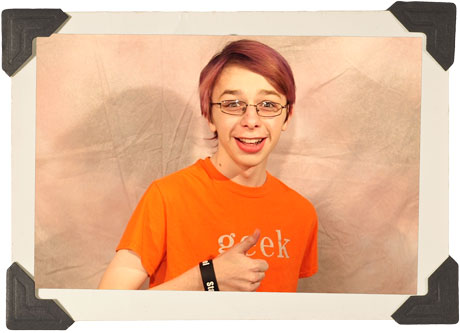
Brennen, 16, says he's the only atheist at his high school but doesn't feel out of place. "I'm out to everyone." The kids in gym class called him "co-pilot" after he wore a T-shirt that said "Science is My Co-Pilot," but Brennen brushed the sobriquet aside. "I ignored them," he says, "because they're idiots."
Harry wants his kids to resist conforming to the South's overwhelmingly Christian culture. Few things tick him off more than people proselytizing to children, so he carefully monitors school calendars and has protested evangelical events that target toddlers. Each year, Harry takes Todd and Brennen to Camp Quest, a secular summer camp where Harry is a counselor.
All this may be too late for Grace, though, who says she can't wait to kick the Carolina clay from her heels and light out for a secular city like Seattle.
Charlotte said she suspects a few parents canceled sleepovers with her children after learning that the Shaughnessys no longer spent Sunday morning in church. Grace and Brennen say they've experienced some awkward moments as the only open atheists at school – but nothing too serious.
The serious difficulties came from Harry's family.
Harry's mother, for one, did not give up on her son and his family. In various ways, some more subtle than others, Marjorie urged them to return to the fold. She told them she prayed for them. She scheduled family events around Mass, hoping they would attend.
When the extended family gathered for dinner, Harry tried to disappear during the pre-meal prayer. He couldn't stomach pretending to pray and would walk out of the room, waiting for his family to finish, hoping they would notice his lack of interest in participating.
Harry's brothers, Jim, 50, and Tim, 42, are believers but don't regularly attend religious services. Jim says their parents were devastated by Harry's break with Catholicism.
Harry's sisters, Ursula, 46, and Trish, 40, are active Catholics married to devout men. Both said they weren't comfortable talking to me for this article.
Both sisters tried to persuade Harry and Charlotte to give the church another try, suggesting books by C.S. Lewis and taking them out for lunch to talk about religion and raising children. Harry and Charlotte say the concern came from a good place. They know Harry's family cares about their souls. Still, they found it irritating.
At Grace's 13th birthday party, her Aunt Trish told her to come to the basement for a special present. There, she gave Grace a set of rosary beads and told her not to tell her parents. At the time, Grace says, she still believed in God. But the present deeply upset her.
Grace took the beads, walked back to the party and promptly gave them to her parents. Then she ran up to her room and cried.
"I was upset because, at this point, there were a lot of mean things happening in my family, and now I was being dragged into it — on my birthday of all days."
Harry and Charlotte were livid.
Harry says his sister felt bad, and it never happened again. But he and Charlotte couldn't help but read the message this way:
Here, please take this gift so you'll become more religious.
I want to save you.
But don't tell your parents.
That last part most troubled Harry and Charlotte.
"Do you really want adults to say to kids, 'Here's something for you and don't tell your parents about it?'" Harry asks. "We don't want to teach our kids to keep secrets."
Harry told his family to stop giving the children religious gifts, and says he returns the favor. He avoids talking about religion with his Catholic nieces and nephews, even when they ask why he doesn't go to church.
But Harry is no saint. He started an online spat with a brother-in-law that led to a serious family feud.
Harry posted something about the Pope on Facebook. Exactly what, Charlotte and Harry can't – or won't – recall.
Ursula's husband, Rod Ruiz, posted a response, and Harry rallied his new atheist friends to join his side. They piled on, and the thread got painfully personal.
Ursula and Rod didn't attend the family Christmas celebration that year. Harry's mother, who lives to have her children together on the holidays, was devastated.
"None of us liked seeing her so upset," Grace recalls. "My dad and everyone else realized: This needs to get better."
Marjorie still sends cards to Harry and Charlotte every Easter, a quick note to let them know that she's arranged to have a Mass said for them. But she has stopped trying to persuade Harry and his family to come back to the church.
I visited the Shaughnessys' church, St. Joseph's, in Raleigh, this winter to talk with their pastor, hoping to understand more about families who disagree about religion. Monsignor Jeffrey Ingham said neither Jim nor Marjorie Shaughnessy had confided in him about Harry, but many other families have sought his advice in similar situations.
"There's only one thing they can do," he said, "and that's pray for their son. It is possible to bring him back to the church, but not by argument — only by example."
Ingham noted that the day we met – December 14 — was the feast day of St. John of the Cross, the 16th-century Spanish friar who wrote about his spiritual crisis in the poem "The Dark Night of the Soul."
John of the Cross suffered intensely, writing some of his poems while imprisoned by fellow friars, but he allowed his agony to goad him closer to God, Ingham said.
"We experience the blahs, the emptiness, the sense that things aren't the way they're supposed to be. But that's all part of God's grace. He's calling us to something deeper."
For many doubters, their angst is sharpened by a sense of isolation, a feeling that nobody knows the trouble we've seen, in the words of the old spiritual. But Harry comes from a large and loving family, which, as he well knows, suffered alongside him. That's especially true of his mother, Marjorie.
"She told me she cries every day," Harry says. "That's painful to hear – but at least she told me."
I asked Harry if anything could change his mind about atheism. He said he's always open to new information but tried to believe in God for a long time.
"My mother says faith is a gift," he says, "and I just don't have that gift."
As he became more involved in atheism, Harry felt the closeness he'd shared with his mother slipping away. He decided to set a monthly lunch date with her.
At first, he says, it was awkward. The chasm between them was hard to bridge. But they found other topics to talk about, like Grace's success at college and Brennen's interest in writing.
After lunch one day, as Harry and his mother walked through the parking lot, she noticed that they both had bumper stickers on their cars.
Hers said "JMJ," which stands for Jesus, Mary and Joseph, the Holy Family.
His: "Imagine No Religion."
Mother and son shared a laugh.
Laughter flows freely in the Shaughnessy household. Every time I visited them in Wake Forest, Harry and Charlotte hosted a party. I don't flatter myself. Their social calendar is so full, Grace calls her parents "recycled teenagers." They didn't have much fun when they were young, Harry shoots back with a smile. They were busy raising her.
Most of Harry and Charlotte's parties were low-key, pizza and beer affairs. Almost every guest, it seemed to me, was from the local atheist group, the Triangle Freethought Society.
Harry held court in the kitchen while Charlotte mingled, a glass of white wine in hand. Neither atheism nor faith was mentioned much, except by a few guests who grilled me about being a religion reporter, the gist being: Why is such a job necessary?
The absence of God-talk was typical, Harry says. When you first leave the church, it's painful, and you want to tell everyone how much religion hurt you, he says. You want to persuade others to forgo faith as well, often by mocking religion, which Harry did plenty of.
At a New Year's Eve party in 2011, he and a friend held a "debaptism" ceremony, renouncing their membership in the Catholic Church.
Laughing, they symbolically blow-dried the baptismal waters that had consecrated them Catholics as infants. Harry signed a "debaptism certificate," a form made up by the Freedom From Religion Foundation. He also signed a more serious document: a formal certificate to remove himself from the membership rolls of the Catholic Church.
He never bothered to mail it.
It doesn't matter to him anymore, Harry says.
He doesn't want to talk about religion or Richard Dawkins' latest book. He's moved past that. The community of atheists he and Charlotte found has become a second family, they say. They take vacations together, talk through troubles and watch each other's kids.
"There's the family you're born with and the family you chose," Charlotte says. "And this is definitely the family we've chosen."
Harry and Charlotte's 'chosen' family

Todd Stiefel, an atheist activist who runs Openly Secular, a campaign to encourage atheists to come out of the closet.

Sue Kocher, a feisty ex-Catholic and ardent political activist who believes religion is responsible for a host of social ills.

Kim Ellington co-hosts the American Humanist Association's podcast with Todd Stiefel. Charlotte considers her the sister she never had.

Matt Killingsworth, a former fundamentalist preacher who quit because he couldn't understand why God would allow so many bad things to befall the good people in his congregation.

Sam Khouri, who witnessed religious strife during his native Lebanon's long civil war among Sunnis, Shiites and Christians.
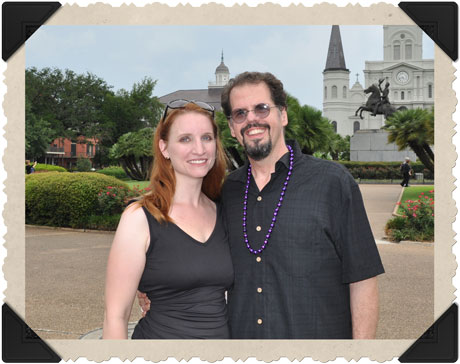
Joey Carabetta, Harry's friend and business colleague, and Amy Carabetta, his partner. The Shaughnessys met Amy through Parenting Beyond Belief.
These members of their "chosen" family, who I interviewed during the past year, are all active in the Triangle Freethought Society. Harry met many of them in 2009, when TFS held its second-ever meeting in a library in Cary, North Carolina. At the end of the meeting, they asked Harry to join the board.
"You could tell that he was smart and very, very passionate," says Stiefel. "He looked like someone who could get things done, which is the highest compliment you can pay in the nonprofit world."
Harry shrugs off the praise, saying that his years of running a small business taught him a unique set of useful skills: how to run a meeting, set a strategy, send an email blast and compose a PowerPoint presentation.
The idea behind TFS is that "heathen happy hours" are fun, but in a state like North Carolina, where it's still unconstitutional for atheists to hold public office, political activism is pressing. In recent years, state lawmakers have passed a law encouraging teachers to pray at public schools and tried to force through a bill declaring an official state religion.
Fighting a church-state war may seem quixotic, especially since atheists are so outnumbered, but it helps to have a sense of humor. One gambit in particular bore the hallmarks of Harry's prankster personality.
Knowing that conservative Christians would want to reserve the lawn at the state Capitol in Raleigh on National Prayer Day, TFS beat them to the punch, forcing the ceremony to move down the road to a less prestigious spot.
"We separated church and state by at least two blocks that day," Harry jokes.
In 2012, Harry was elected president of TFS, and soon groups like the American Humanist Association were booking him for speeches at national conferences and seeking his advice on how to fund-raise and recruit new members. The Secular Student Alliance asked him to join its board.
It was exciting, Harry says. But he had bigger goals in sight. The guy with the goofy sense of humor was getting serious.
On a sunny Sunday in June, just as church let out, Harry addressed a house-full of atheists in downtown Raleigh. He'd heard many of the questions before.
How much would it cost?
We'll find donors, Harry answered.
Who'll run it?
We'll find volunteers.
What if no one comes?
They'll come, he hoped.
Harry sipped on a container of Soylent, a food substitute he'd been drinking because he didn't have time to eat, and wore his fanciest weekend attire: faded jean shorts, white sneakers and a Flying Spaghetti Monster golf shirt.
The presentation was all business.
For 40 minutes, like a salesman in a boardroom, Harry pitched his new idea in a series of PowerPoint slides. He started with a brief history of the Triangle Freethought Society, how it was founded for political activism and later added educational events and community service projects. He listed the types of people attracted to TFS: atheists, agnostics, freethinkers, non-theists, humanists and skeptics.
Quiz: What kind of atheist would you be?
Loading...
Over the past several years, this disparate group had bonded over a shared commitment to "reason and logic" rather than authority and tradition, he said. But that wasn't enough to keep TFS growing. What this society needed now was a place to gather weekly where its members could connect to a community and a cause.
What we need, Harry said, is a church.
The room grew quiet as a monastery.
Harry pressed on.
He drew on his personal story, telling the room that he was once Catholic, but when he left the fold, he left good friends and family behind. TFS had helped, but Harry missed the emotional lift he sometimes felt after Sunday Mass.
"We want this Sunday program to build people up and send them back into the world!"
Harry had heard the arguments against starting a Sunday congregation; some of them came from his best friends. Sue Kocher, for instance, worried it would detract from the society's central mission: keeping religion out of politics.
The argument aroused passion on both sides. One night, I watched two people close to Harry scream at each other about whether TFS should prioritize activism or community.
Harry didn't mention it, but science supports his congregation idea.
His friend Todd Stiefel told me about a lecture on the neurobiology of religion that he'd heard at an American Atheists convention several years ago. It was delivered by Dr. Andy Thomson, a psychiatrist who lives in Virginia and has studied the components of religious belief.
Thomson has become famous among atheists for an exercise that seems to demonstrate how worship services work – why even lapsing Catholics like Harry sometimes felt that "Sunday morning high" after church.
In his experiment, Thomson asks members of the crowd to pinch themselves, hard, to gauge their pain threshold, and then to put their arms around each other and sing a few verses of "Amazing Grace."
Stiefel, who participated in the exercise, says the crowd couldn't keep a straight face. Atheists singing "Amazing Grace"!?! But afterward, he said, he felt bonded to this unlikely choir, and when he pinched himself again, his pain threshold had increased.
The experiment demonstrates the power of communal rituals, Thomson told me in an interview. Joining hands and singing together floods our brain with soothing endorphins, which boost our sense of trust and cooperation.
It's similar to how fans bond at the ballpark, and why after singing "Take Me Out to the Ballgame" and standing for "the wave," we often feel good, even if our team loses.
"The real reason religion is so powerful has nothing to do with theology," Thomson says. "It's the coming together of congregations. And one of the main problems in the secular movement is that they don't have good rituals for bonding."
Some atheists are trying to change that.
In the last several years, several dozen godless congregations have popped up across the country. One group, the Sunday Assembly, which was founded by two British comedians, has planted 29 in the past two years, with an equal number overseas.
Still, many atheists can't stand the sight of a steeple, and many secular congregations have dwindled down to a few diehards within a generation.
His "atheist church," Harry argued, would be different.
Over the course of many months, I watched him wear down his fellow board members, convincing them through force of will, if not argument, that TFS needed the Sunday service. He needed it.
"I think a lot of them are supporting this just because they know how much it means to me," Harry said. One board member quit, though, saying he was uncomfortable with the direction TFS was taking.
Eventually, Harry and the board settled on a compromise. They would try six services, holding them on alternate Sundays from September until December.
"And if it sucks," Harry said, "we're going to do something different."
They had a lot to accomplish, with little time, an all-volunteer staff and precious little expertise outside of Matt Killingsworth, a former pastor who was not eager to give up his Sundays.
They needed a building with parking and a central location, and hopefully not a policy of charging extra for atheists. There were speakers to line up, a service to create, music to write, forms to sign, bills to pay.
Oh, and they needed a name.
TFS kicked around dozens of candidates. Many had religious connotations, which they desperately wanted to avoid.
Charlotte's favorite was AMUSE, Inc.: A Mostly Useless Secular Experience, It's Not Church. Others thought the acronym was clever, but complicated.
Finally, just 45 days away from the first service, they settled on this: Secular Together.
Boring, Harry thought. But they were out of time.
As the first Secular Together gathering approached, Harry pulled all-nighters, making sure every detail was just right, every contingency planned for.
"It is a lot harder to pull this off than I had ever imagined," he said one night, sounding tired and stressed out.
Joey Carabetta was concerned about his friend.
"He is killing himself, and I worry about it not being successful. He's trying not to show it, but he is fixated on this."
If it didn't succeed, Harry would be crushed.
The night before the first Secular Together service, Harry set two alarms. He was up before either rang.
Charlotte and Brennen helped pack the minivan, stuffing wires and microphones and computer hardware into every crevice. Then they squeezed themselves in.
Harry tried to stay calm as he hit what seemed like every traffic light. The irony of running a red would have been rich, he thought, as he waited at the wheel. His father had always raced to get the Shaughnessys to church on time.
Finally, they pulled into the parking lot of the Laurel Hills Community Center in Raleigh. Surrounded by McMansions and strip malls, the concrete building wore a drab yellow awning and carpets gray with age. It smelled like a mix of stale sweat and industrial-strength cleaning supplies.
To Harry, it soared like the Chartres Cathedral.
He floated around Meeting Room B, where the service would start in an hour, wearing blue cargo shorts and his Flying Spaghetti Monster golf shirt.
He checked in with the man setting up the soundboard, whose T-shirt said "Logic: Religion's Natural Predator." He chirped a greeting to the kids playing in a sunny corner and straightened rows of chairs. He admired the 10 boxes of Krispy Kreme doughnuts and untangled the wires that ran across the floor.
Seeing everything was in order, Harry waved his hands in the air and started to sing the song "Happy."
At quarter to 10, Harry's chief partner in setting up Secular Together ambled into the room.
Marshall Brain is the mind behind the website "How Stuff Works," which he sold to the Discovery Channel for $250 million in 2007.
Since then Brain, who lives near Harry in North Carolina, has turned his attention to studying how God "works," and how atheists can live moral and meaningful lives. After a long courtship, Harry persuaded him to deliver the "inspirational" part of the Secular Together service. You know — the sermon.
Their personalities are poles apart: Brain is low key and mostly serious. Harry is high-energy and mostly humorous. But Brain admires Harry's ability to unite people around a common cause; Harry admires his counterpart's intellectual acumen.
Brain's chief advice to Harry before Sunday's service started was this: Don't be weird.
Harry made no promises.
As the clock ticked toward 10, the room began to fill.
Harry had a hunch Secular Together would get a good crowd, based on the number of people who had registered online, but this – this was unexpected.
They came in clusters of twos and threes. Young parents clutching children. College students and teenagers hiding behind hipster glasses. Middle-aged men wearing pony tails and atheist T-shirts. Even after they added several rows of chairs, people stood against the walls and bunched together in the back of the room.
As the congregation settled in, Harry bounced to the front of the room, clapping his hands in a quickening rhythm like a cheerleader at a pep rally. They sang a few songs, and then, at last, Harry explained why he'd assembled this congregation.
"Welcome to the very first ever Secular Together!" he said with a whoop.
"Hopefully, this will be a place where we're going to have fun, get to know each other, learn some things about how to live a better life, be inspired and get our energy back for the week!"
Years ago, Harry told the congregation, he was a Catholic, and the church satisfied some, if never all, of those needs. With Secular Together, he had a chance to start over, he said, borrowing the parts of religion he liked and leaving the rest.
Looking back through the liturgy of the Catholic Mass, Harry continued, he found little that would suit his new congregation. So instead of hymns, Secular Together would sing Top 40 hits like "Eye of the Tiger." Instead of Communion, they'd perform comedy skits. In lieu of a sermon, Brain would deliver a TED-style talk.
Then Harry made an admission: Some church practices are too good to forgo. So, yes, there would be a potluck picnic after the service.
The first Secular Together ran for nearly two hours, too long by some accounts. But Brain's "sermon" and the small-group discussions that followed were deemed a success. Other moments, like the improvisational comedy skits, featured cringe-worthy jokes.
Spend 60 seconds in an 'atheist church'
Still, most people agreed that it was an admirable first effort, and as the last notes of the last song lingered in the air, Harry beamed. The "church high" had returned.
An anonymous donor had given $5,000 to help keep Secular Together going, at least for a little while, Harry announced at the end of the service. As the congregation filed out, he chatted up children and thanked their parents for coming, looking very much like a pastor.
After the equipment had been packed up and Harry had returned home, he bragged to Grace that more than 100 people had flocked to his atheist church. It was standing-room only, he said with a satisfied smile.
Grace had her own reasons to party that Sunday: It was her birthday. The little girl whose question on the eve of her First Communion had set her father on a new path was turning 22. Harry and Charlotte began the day celebrating their chosen community, united by a Humanist moral code they felt proud to pass on to their children. And now, they would end the day with Grace, who had become a confident atheist herself.
The plan was to meet Harry's family – his parents, sisters, brothers-in-law and nieces and nephews – for dinner at a restaurant in Raleigh. Harry didn't expect his family to have much interest in Secular Together. His parents change the subject whenever Harry's atheist activism is mentioned, which saddens their son.
"I'm doing what they taught me to do," he complains, "just without the dogma."
More than anything, Harry wants his parents to know that he's following the lessons he learned as a young Catholic. Told that nothing supersedes spiritual truth, Harry searched until he found his. Shown that serving others is the highest human calling, Harry devotes endless hours to helping fellow atheists. Brought up to believe that life is best lived within a moral community, Harry built a godless church.
Harry and Charlotte arrived late for Grace's birthday dinner but the family had waited for them. Before the food arrived, Harry's mother folded her hands and began to lead the table in prayer:
"Bless us, oh Lord, and these thy gifts ..."
Grace distracted her little cousins, and Charlotte shot Harry a look. He shrugged, his shoulders seeming to say that some things will never change. But today, Harry was one happy atheist.
He'd let go of his hopes for heaven and fear of hell and learned to live in the vast, uncertain space in between.
Postscript: Harry and the Triangle Freethought Society held five more Secular Together services between September and December, fine-tuning the formula and drawing about 75 people each time. At the end of the trial period, TFS decided to keep Secular Together going, holding afternoon services on the first and third Sundays of each month.
But Harry and Marshall Brain have even bigger visions in mind: They want to fill a basketball arena with an atheist event, much like megachurch pastors in the Bible Belt.
On the home front, Harry and Charlotte will celebrate their 25th anniversary in June next year. Though it's more than a year away, they discuss their party plans with the furtive glee of teenagers plotting a romantic rendezvous. They want to renew their vows, with one major change: This time, they will pledge their lives to each other with no mention of God. They want the service to reflect how far they've traveled, and they want it to be funny.
More from CNN
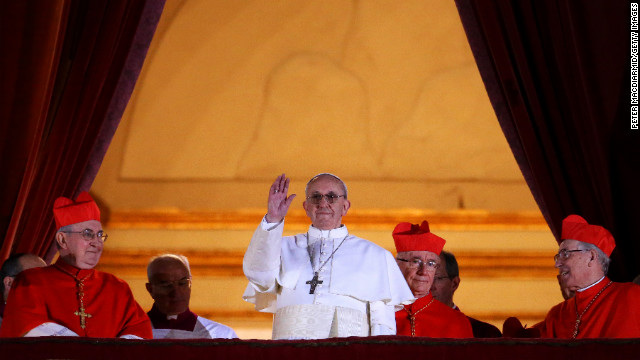
How to really measure the 'Francis effect'
Maybe Catholic Church doctrine hasn’t changed much. But there’s more than one way to measure a pontiff’s influence on his far-flung flock.
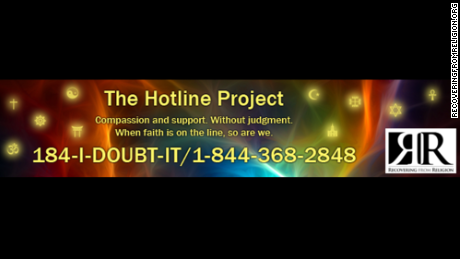
1-800-DOUBTS
Volunteers staff what is believed to be the country’s first helpline for people wrestling with religion, suffering from a loss of faith, or confused about why a family member has suddenly embraced atheism.
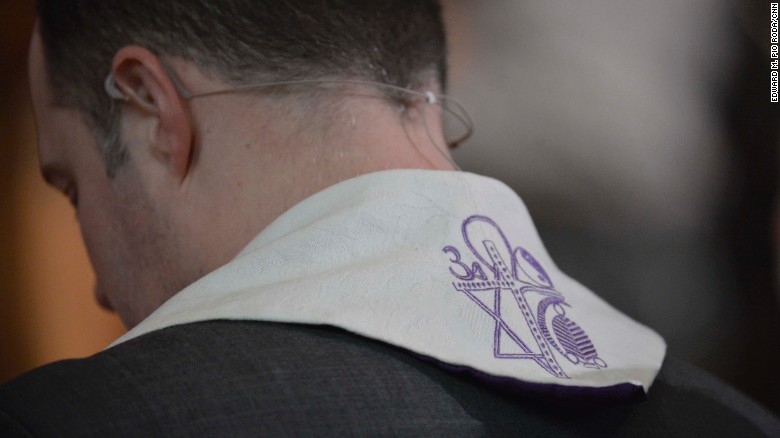
How the ultimate scandal saved one pastor
Sex, a family secret and the collapse of one of America’s biggest megachurches. Pastor D.E. Paulk reveals the inside story behind the public humiliation that became his salvation.
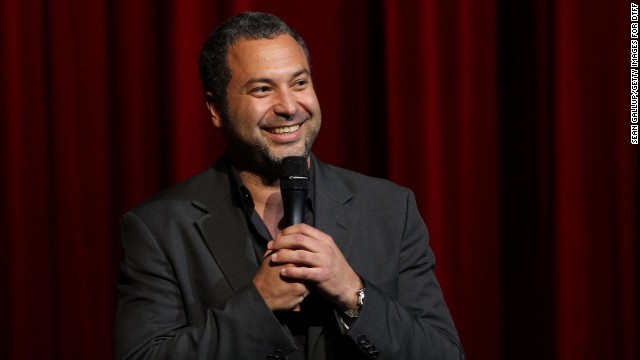
How Muslims flipped the script in Hollywood
For decades, Hollywood often cast Islam in an ominous light. After 9/11, the typecasting only increased. But American Muslims may be finally smashing the silver-screen stereotypes.
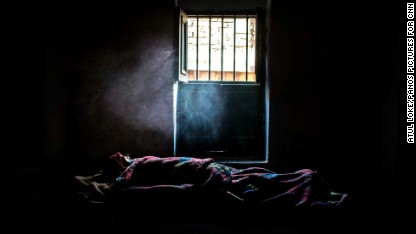
Hotel Death
It's a place of celebration, where dying guests are promised freedom for their souls. And where one man, whose father is No. 14,544 in the ledger, finds himself torn between two worlds.




